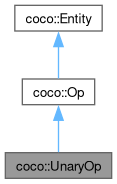Loading...
Searching...
No Matches
coco::UnaryOp Class Reference
Op with a single argument. More...
#include <Op.h>
Collaboration diagram for coco::UnaryOp:

Public Member Functions | |
| UnaryOp () | |
| UnaryOp (const UnaryOp &)=delete | |
| UnaryOp (UnaryOp &&)=delete | |
| virtual | ~UnaryOp ()=default |
| uint32_t | arity (void) const final |
| Return the number of arguments (# of child Ops) | |
| Op * | arg (uint32_t n) const final |
| Return N-th argument. | |
| std::set< Object * > | uses (void) const final |
| Return a set of object(s) used during execution. | |
| Op * | arg (void) const |
| void | arg (Op *arg) |
 Public Member Functions inherited from coco::Op Public Member Functions inherited from coco::Op | |
| virtual | ~Op () |
| template<typename T > | |
| T | accept (IVisitor< T > *v) const |
| template<typename T > | |
| T | accept (IVisitor< T > &v) const |
| template<typename T > | |
| T | accept (IVisitor< T > &&v) const |
| void | accept (IMutator *m) |
| void | accept (IMutator &m) |
| void | accept (IMutator &&m) |
| Instr * | parent (void) const |
| Op * | up (void) const |
| Return a pointer to the parent Op. | |
 Public Member Functions inherited from coco::Entity Public Member Functions inherited from coco::Entity | |
| virtual | ~Entity ()=default |
| Module * | module (void) const |
Detailed Description
Constructor & Destructor Documentation
◆ UnaryOp() [1/3]
|
explicit |
◆ UnaryOp() [2/3]
|
delete |
◆ UnaryOp() [3/3]
|
delete |
◆ ~UnaryOp()
|
virtualdefault |
Member Function Documentation
◆ arg() [1/3]
|
inline |
◆ arg() [2/3]
|
finalvirtual |
Return N-th argument.
- Note
- The behavior of arg(n) is defined only when n < artiy()
Implements coco::Op.
Referenced by tflimport::MaxPool2DGraphBuilder::build(), tflimport::ReLUGraphBuilder::build(), tflimport::ReLU6GraphBuilder::build(), tflimport::build_activation(), OpPrinter::visit(), OpPrinter::visit(), OpPrinter::visit(), OpPrinter::visit(), and OpPrinter::visit().
◆ arg() [3/3]
|
inline |
◆ arity()
|
finalvirtual |
◆ uses()
|
finalvirtual |
Return a set of object(s) used during execution.
NOTE There is no 'def' method as Op is not allowed to define a new object
Implements coco::Op.
Definition at line 82 of file Op.cpp.
83{
84 std::set<Object *> res;
85
87 {
89 {
90 res.insert(obj);
91 }
92 }
93
94 return res;
95}
std::set< Object * > uses(void) const final
Return a set of object(s) used during execution.
Definition Op.cpp:82
References arg().
The documentation for this class was generated from the following files: